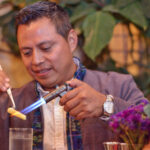FOUNDER OF NEW ZEALAND RUM SOCIETY: RICHARD NICHOLSON
Richard Nicholson is from New Zealand but is constantly on the rum road around the world! He consults with Independent Bottlers and on private collections, as well as trading. Founder of the New Zealand Rum Society, he has also been a judge at various awards and is on a 13-month world tour of Rum Distilleries and related activities. Learn more about him in the next interview:
TRL: What does the rum mean for you? What made you fall in love with rum and when did it happen?
It’s a passion for me. Rum has taken me to places I don’t think I would have traveled to had I not fallen in love with rum. Nor would I have fully appreciated that country, if simply a tourist. Actively seeking out those that make, sell and drink rum, as well as my own studies, has helped me better understand the historical and culturally significant aspects of that place, and as it relates socially and economically in modern times.
Some loves come suddenly, some come more slowly, and others go through crazy, turbulent rides! I’d say all three for me. To explain.
When very young, I was drawn to flavors and smells. By the time I could drink alcohol, I’d developed (what I thought!) was a good palate. Oh, how much I had to learn! Rum is a spirit that was (still is, I believe) part of New Zealand’s drinking fabric. By that I mean rum and coke was a teenage rite of passage, so to speak, similar I guess to maybe tequila for US students of age. But by the time I was in my mid-twenties, however, I didn’t want to touch it and had moved into mainly wine, along with brandies. And then Scotch whisky. But a friend handed me an Appleton 21 about ten years ago and that was it. I was back!
My exploration began slowly and, frankly, was as much frustrating as it was enjoyable, due mainly to a lack of information and misinformation. Buying good ones and some not-so-good ones and my palate and taste developing. A bit of a love-hate relationship formed, ha! But over the last, I’d say five years I’ve better understood the category and just how well-crafted and beautifully diverse rum can be. And yes, I’ve fallen deeply in love with it!
TRL: Three essential characteristics that define the rum according to your perspective.
The diversity. Different countries making different types, using different methods. You could never get bored with rum and you can substitute the right rum for a lot of other spirits, in cocktails especially.
Level of authenticity and transparency. Some brands do that well, while others do not.
The people! Rum is best enjoyed with others, but of course, it doesn’t have to be!
TRL: What is the most important contribution you have made to the rum industry?
I wouldn’t suggest ‘important to the rum industry’, but I have run masterclasses, founded the New Zealand Rum Society, and been a judge. I’ve also assisted some IBs with the right approach to producers.
I also try my best to spread the word and educate in my own modest way. At shows, when behind a counter, I’ve been told I can be very passionate, engaging, and educational, so that’s nice to know.
TRL: Benefits that the rum industry has given you.
Innumerable! To name a few…
Foremost, I’ve gathered around me a fantastic group of like-minded rum lovers that I consider good friends.
It’s given me a way in which to better learn history, both the good parts and the bad parts. Knowledge is empowering.
I’ve ventured in ‘behind the scenes’ at distilleries and events because of the way those in the industry have embraced me.
But as the song goes, these are just a few of my favorite things.
TRL: What’s another thing you are passionate about, besides rum? Why?
Wine and writing. But I could list a lot more passions.
In terms of wine, I grew up with it and learned, I guess, to better appreciate it. Not to say I had a good understanding of all methods and types of wine, but over the years, I learned. Still am! It’s very much part of my lifestyle, and I’m always appreciative when in New Zealand because of the superb wines we produce.
TRL: What is your favorite place for drinking rum?
The place it is produced is as authentic an experience as you can get and it certainly adds to the moment, however, a great bar, or simply hanging with friends at home, is equally enjoyable.
TRL: Favorite drink + Recipe
Daiquiri. Cuban or Puerto Rican light rum (flavor, weight, 40-45% abv) at 60ml (2 ounces) and the right, for me, sweet/sour balance that’s usually 25ml (just over 3/4 ounce) fresh lime juice and 12.5ml simple syrup at a two-to-one sugar/water ratio. But it’s adjusted depending on lime tartness. However, with my daiquiri ‘riffs’ I love working with other rums and sugar ingredients – blending different profile rums, bigger rums, heavier or lighter syrups, granulated sugars, etc.
But if you mean rums neat, then everything from a bold unaged cane juice rhum to a big, well-rounded molasses longer-aged rums. Almost always sipped neatly.
TRL: Why is it important to educate the rum consumer?
Two reasons, from my perspective.
Rum, because of its diversity and the wide-ranging places of origin, has many descriptors, especially as that relates to categorization and language. Within the rum geek world, there seem to be many attempts at shoe-horning rum into a narrow narrative (usually that best fits the beneficiary), yet less on respecting an individual country’s traditions how they make rum and how they like to drink. I’d like to see further improvement in the latter.
Secondly, there is a lot of misinformation out there, often because of sloppy journalism, undue influence from brands (advertisers/sponsors), and ridiculous, manipulative, or lazy marketing that then either leaves the consumer more confused than ever or leads them down the wrong track. I know, I experienced it when I first started getting into rum. That has to change.
But education is a two-way street. The consumer must have the desire to want to better educate themselves, as much as there needs to be continued efforts to provide worthwhile and accurate content.
TRL: Any tips to train the palate and taste a good premium rum?
The more rums you try, the better you train your palate. Experience counts. But have a structured and consistent method of how you wish to evaluate the rum.
I also like to have an ‘indicator’ rum as part of some of my tastings, i.e. a rum that I know well, as a way in which to evaluate the others from and to ‘center’ my nose and palate.
Also, assuming there is enough time (unlike when judging extensive flights or at rum shows), then try at least two positions (distances) from your nose to evaluate aroma, then side to side, i.e. one nostril to the next. And then repeat about 5-10 minutes later. On the palate, I’m conscious of entry, mouthfeel, and length first, then I concentrate on flavor layers and how (or if) this follows the nose, and then alcohol integration and overall balance.
TRL: How can the rum contribute to improving the crisis in some countries?
In the context of the question, rum is a commercial enterprise that creates economic benefits to a country, but also to the producer, and it needs in-country government support and also controls, wherever possible and practical. But it’s a wide-ranging and complex question, so depending on which country we are referring to, and the specific crisis they are having, be that commercial, economic, social, or environmental challenges, it would take a lot more time to answer properly.
TRL: Is the commitment to sustainable development the key to success for the permanence of the rum industry in the world? Why?
It’s one key to success. Not the only one.
Every industry is being challenged by this question. Some players are doing better than others. Without regulation there is less incentive, so my belief is this is where the greatest effects will come from, i.e. government agencies working with producers and others to come up with the right frameworks.
It’s not a destination, though. It’s a commitment that a producer, a distributor, and a consumer needs to be making, to keep doing better.
For producers who are being rewarded by what the land is giving them, then a continued appreciation and respect for those resources and how to best protect them should be part of business decision-making.
For those being rewarded along the supply/distribution chain, then a greater awareness of their carbon footprint needs to be considered i.e. a willingness to investigate ways in which to reduce environmental affects such as bottle production (and packaging), shipping weight, waste, and so forth.
TRL: Who would you like to meet in the rum industry? What would you say to him/her?
I’ve been very fortunate to have met a lot of those I respect in the industry. Many more to meet, too.
I’ll suggest though, that those making rum back in the 17th century (or earlier) are who I’d like to meet, and I’d simply say thank you. However, or maybe because of it, the conditions in which they were making the rum, including harvesting cane and making sugar, is a whole other subject that we probably don’t have time in this interview to give suitable focus.
TRL: Plans you have when you leave the rum industry.
I do not believe I ever will.
TRL: Why is the role of the bartender important in the rum industry?
Bartenders play an extremely important role because they can introduce rum to a consumer, or elevate rum as a category by presenting great rums and rum-based cocktails that the consumer might then explore further–hopefully both at the bar and when they get home.
Bartenders are also unofficial, for the most part, frontline ambassadors for brands, so good training for them means good messages passed on to the consumer. If I can be so bold, some brands need to note this, just as those that purchase rum for their bar need to also take note. It shouldn’t be all about whoever cuts the best deal. I’m not convinced the customer wins in that scenario.
TRL: What is your advice for new generations in the rum industry?
Be curious. Be open-minded. Explore the diversity that rum offers as best you can. And have a willingness, even if it means investing your time, to learn the right things via the right content providers. And don’t get caught by the keyboard warriors who, ironically, bash certain rums yet believe they are fostering the rum community. Drink what you like, but knowing what you’re drinking is the best-said thing when it comes to exploring rum.
There are a lot of good places to get the right formation and I wish I could name all that have helped me, and still do, but to name a few and of course, including The Rum Lab, try the Lone Caner. Not just for reviews, but a huge amount of trustworthy information and links to explore others also providing great content. Cocktail Wonk is another excellent resource, and also buy Matt Pietrek & Carrie Smith’s books, Modern Caribbean Rum, and Minimalist Tiki. And TheRumCast puts out a fantastic podcast series that will take you behind the scenes with producers and all things related to rum.
If you are after an easy-to-follow guide on flavor camps and what are then some brands and expressions that you might wish to purchase, head over to The Whisky Exchange ‘Rum by flavor’ guide that was developed by my good friend Dawn Davies and her team.
Attend shows as well. You’ll get to ask questions directly to the producers and brand representatives. And get to hang out with like-minded people!
TRL: How can people learn more about you? Website? Social media page?
New Zealand Rum Society – IG and Facebook (FB is a members group. Join by answering three simple questions).
PS I’m not a prolific poster (is that a word?), so take that as you may.
About The Author
Creative Director for EmpresasFH and Director of HOFFMANNdesign. Born and raised in Caracas, Venezuela, Mr. Hoffmann has been one of the most important designers for prestigious companies in South America, including Disney, Cartoon Network, Mattel among others.





